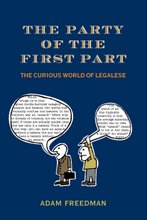While presiding over a rape case, Nebraska Judge Jeffre Cheuvront had the bright idea of barring attorneys and witnesses from using words including “rape,” “victim,” “assailant” and “sexual-assault kit,” and ordered witnesses to sign papers saying they wouldn’t use the words. Words such as “sex” and “intercourse” were allowed. State law allows judges to bar words or phrases that could prejudice or mislead a jury. (Story from AP).
The idea - apparently - was to prevent the use of words that would unduly prejudice the jury against the defendant. The judge's move certainly didn't do the defendant any harm -- the publicity over the restricted vocab led the judge to declare a mistrial.
Did the judge have a point? Isn't language the way to protect the defendant's rights -- is the defendant covered by things like Miranda and evidentiary rules?
Update - a Pennsylvania court recently rejected a similar attempt to banish "prejudicial" words from the courtroom. See More Icky Words!
Subscribe to:
Post Comments (Atom)


6 comments:
I think that's absolutely absurd. Nobody would suggest, for example, that we need to refer to murder as "non-consensual death." Juries have been deciding sexual assault cases for some time. Experience has shown us that, for all the problems that are present in sexual assault cases, this isn't one of them.
I read about this last week, and I found it outrageous. What about the rights of the victim? Neither "sex" nor "intercourse" has the same meaning as "rape." Personally, I'm sick of defendants having more rights than their victims.
Not sure what the solution is when the defense strategy is to deny that there was a crime and deny there is a victim. Seems as though this should be a permissable strategy, in which case I could well imagine that the use of words like rape and assault could be prejudicial.
Are there any analogs to other crimes? If an accused killer had the idea to recast a homicide as an accident I could imagine a similar (though less politically-charged) situation where the language could carry undue influence... so I guess I'm siding with the ACLU and the activist judge team on this one.
GREAT comments - apologies for the delay in posting. I was on vacation or, as I like to call it, a "voluntary non-domiciliary work stoppage."
Mackenzie, Litassistant: any response to Trace? Is it too prejudicial to allow a witness to say "rape?" Does it depend on the defense strategy? Isn't there a distinction between cases in which the defense says that the sex was consensual vs. cases in which the defense admits that the victim was raped, but argues that THIS defendant was not the rapist (in which case what's the problem with conceding that a "rape" took place).
Murder defendants often try to couch the crime as an accident rather than first degree murder. Happens all the time. Accused rapists also often try to couch the incident in question as consentual sex. That's a normal part of the defenses.
But to have a judge actually rule that the words can't be used is outrageous IMO. Its one thing to make the accuser prove that it was an intentional murder or rape, its another thing for the judge to prevent them from doing so.
Let's be fair! Rape IS unwanted intercourse by force, is it not? by restricting words like "rape," "victim," and "assault," the judge is simply removing the possibility of those words to strike an emotional response with the jury. This is the SAME jury who is supposed to expel all subjective emotion and decide on the objective facts! It seems in effect, the judge has made the jury's job easier, but shows exactly how much the prosecution often relies too much on emotion and not enough on facts!
Post a Comment